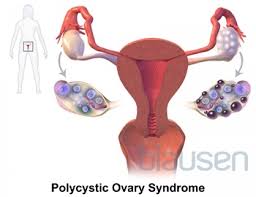Polycystic ovary syndrome (PCOS) is a set of symptoms due to elevated androgens (male hormones) in women. Signs and symptoms of PCOS include irregular or no menstrual periods, heavy periods, excess body and facial hair, acne, pelvic pain, difficulty getting pregnant, and patches of thick, darker, velvety skin. Associated conditions include type 2 diabetes, obesity, obstructive sleep apnea, heart disease, mood disorders, and endometrial cancer.
PCOS is due to a combination of genetic and environmental factors. Risk factors include obesity, not enough physical exercise, and a family history of someone with the condition. Diagnosis is based on two of the following three findings: no ovulation, high androgen levels, and ovarian cysts. Cysts may be detectable by ultrasound. Other conditions that produce similar symptoms include adrenal hyperplasia, hypothyroidism, and hyperprolactinemia.



 Contact Us
Contact Us






 Hospitals
Hospitals
 Doctors
Doctors
 Diagnostic
Diagnostic
 Pharmacy
Pharmacy
 Health Tips
Health Tips
 Blog
Blog

























Comments